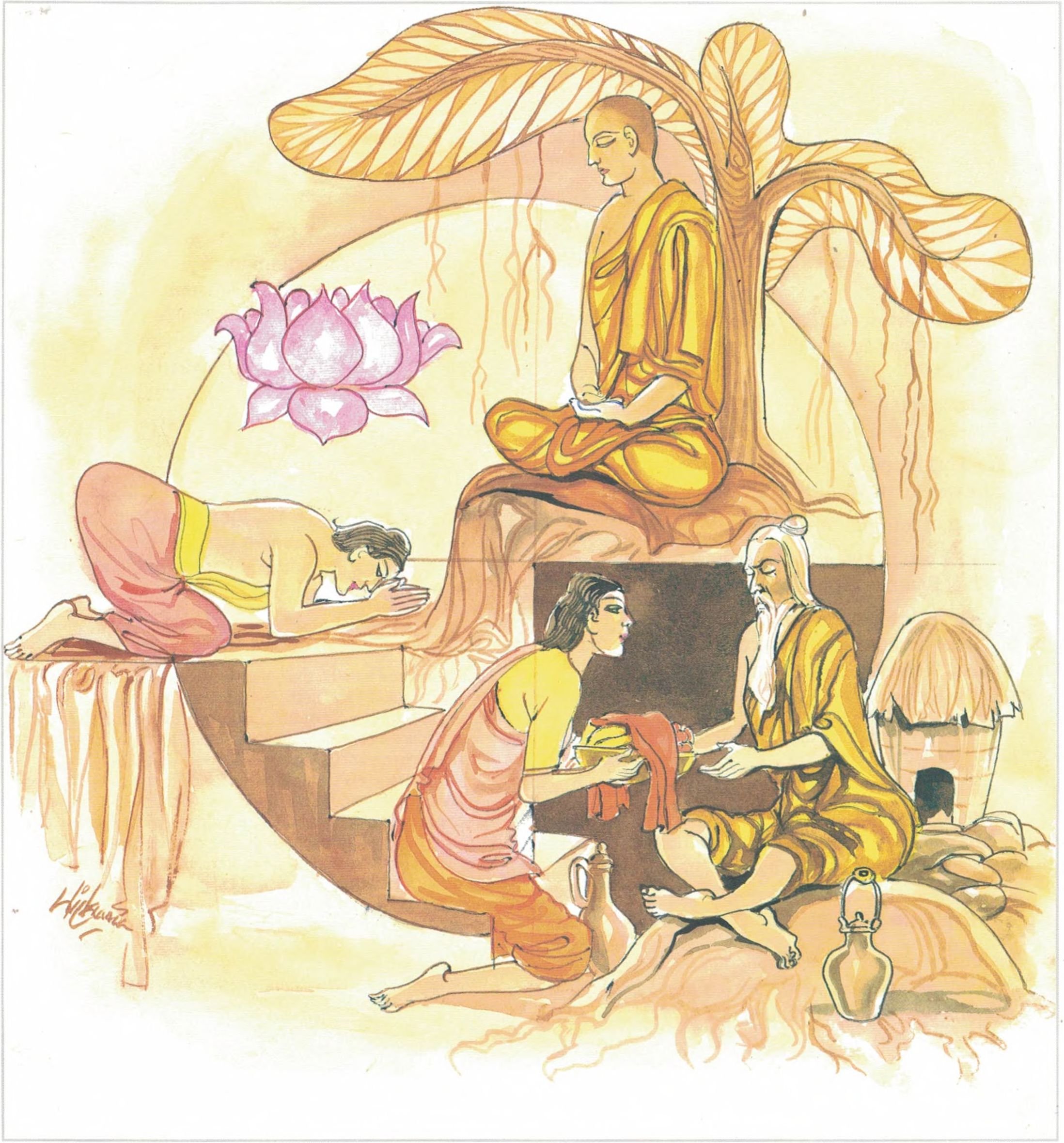Dhammapada (Illustrated)
by Ven. Weagoda Sarada Maha Thero | 1993 | 341,201 words | ISBN-10: 9810049382 | ISBN-13: 9789810049386
This page describes The Story of Venerable Sariputta’s Friend which is verse 108 of the English translation of the Dhammapada which forms a part of the Sutta Pitaka of the Buddhist canon of literature. Presenting the fundamental basics of the Buddhist way of life, the Dhammapada is a collection of 423 stanzas. This verse 108 is part of the Sahassa Vagga (Thousands) and the moral of the story is “Acts of worship and prayer for a year never equal a fourth of homage to the worthy”.
Verse 108 - The Story of Venerable Sāriputta’s Friend
Pali text, illustration and English translation of Dhammapada verse 108:
yaṃ kiñci yiṭṭhaṃ va hutaṃ va loke saṃvaccharaṃ yajetha puññapekkho |
sabbam'pi taṃ na catubhāgameti abhivādanā ujjugatesu seyyā || 108 ||
108. Whatever one who merit seeks should for a year make sacrifice, all comes not to a quarter part of honouring the Noble.
 Acts of worship and prayer for a year never equal a fourth of homage to the worthy. |
The Story of Venerable Sāriputta’s Friend
While residing at the Veluvana Monastery, the Buddha spoke this verse, with reference to a friend of Venerable Sāriputta.
The Venerable approached him and asked him, “Brāhmin, do you ever do a single good deed?” “Yes, Venerable.”
“What do you do?” “I offer sacrificial slaughter.’ (At that time, we are told, it was the custom to offer sacrificial slaughter at an expenditure of immense sums of money.)
The Venerable, after questioning his companion in that manner, conducted him to the Buddha, informed him of the incident, and said to him, “Venerable, tell this man the way to the World of Brahma.”
The Buddha asked him, “Brāhmin, are you correctly reported?” “Yes,” replied the brāhmin.
“Brāhmin, though you should offer sacrificial slaughter for a year, yet would your act not be worth the fourth part of the act of him who, with believing heart, gives alms on the people, or of those who, with good intention, render homage to my disciples.”
Explanatory Translation (Verse 108)
loke puññapekho yaṃ kiñci yiṭṭhaṃ vā hutaṃ vā saṃvaccharaṃ yajetha
taṃ sabbaṃ api na catubhāgaṃ na eti ujjugatesu abhivādanā seyyo
loke: in this world; puññapekho [puññapekha]: one desiring good; yaṃ kiñci yiṭṭhaṃ vā: even some minor alms-giving or; hutaṃ vā: a major alms-giving or; saṃvaccharaṃ [saṃvacchara]: for a whole year; yajetha: offers; taṃ sabbaṃ api: all that; catubhāgaṃ na eti: does not become even one fourth (compared to); ujjugatesu: straight walking person (arahat); abhivādanā: saluting; seyyo [seyya]: which is greater
In this world, an individual seeking merit may give alms and offerings during a religious festival. Or else that person may conduct an elaborate sacrifice for a whole year. But the merit from all those activities put together is not even one-fourth the merit one gets by paying homage to a person who walks straight–an arahat.
Commentary and exegetical material (Verse 108)
brahma: In several verses of this Chapter, references are made to Brahma. Besides the stories that have occasioned the pronouncing of several of these stanzas, too, have to do with those who practiced various rites and rituals, with the intention of attaining the Brahma world. What is the Buddhist attitude to the concept of Brahma and the Brahma worlds? In Dhammacakkappavattana Sutta (Buddha’s First Sermon–The Turning of the Wheel of Righteousness) reference is made to Brahma worlds.
Hearing this, the Devas Cātummāhārājikā, Tāvatiṃsa, Yāma, Tusita, Nimmānaratī, Paranimmitavasavattī, and the Brahmas of Brahma Pārisajja, Brahma Purohita, Mahā Brahma, Parittābha, Appamānasubha, Ābhassara, Parittasubha, Appamānasubha, Subhakinna Vehapphala, Avīha, Atappa, Sudassa, Sudassī, and Akaniṭṭha, also raised the same joyous cry. Thus at that very moment, at that very instant, this cry extended as far as the Brahma realm. These ten thousand world systems quaked, shook and trembled violently.
Throughout Buddhist Literature, references are made to Brahma; but in the Buddhist system, one’s liberation is not sought through sacrifices to gods. Brahma world is considered the abode of the creator-god (Mahā Brahma). The idea that Brahma is the creator-god is sarcastically dismissed in Bhūridatta Jātaka (The Birth Story).
This Jātaka Tale (Birth Story) enquires thus:
“He who has eyes can see the sickening sight,
Why does not Brahma set his creatures right?”
Although there is a heavenly being called Mahā Brahma, who believes he is the creator, and whom the brāhmins believe is the creator, and is recognized in Buddhism, Buddhists do not believe that he is the creator of the world.
